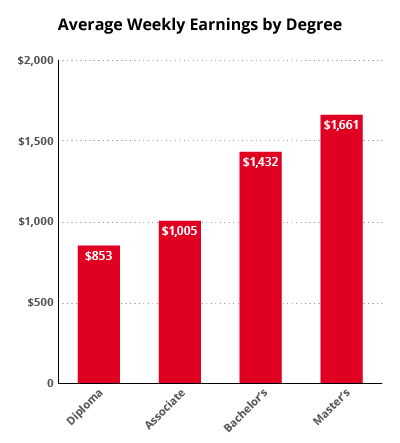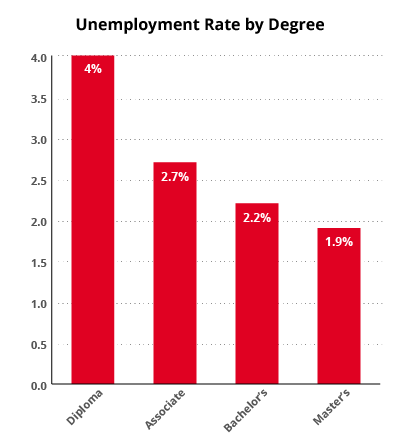Does Education Payoff? The Average Value of a College Degree

The Importance & Benefits of a College Education in Today’s Job Market
Are you feeling stuck in your personal and professional life, with no clear path to progress? If so, you might be wondering if furthering your education is the key to unlocking new opportunities. But then comes the question—is it worth the investment of your time and money? The answer lies in the fact that higher education is an investment in yourself, and it pays off in the long run. The skills and knowledge gained through the college experience are crucial for success in today’s evolving job market. With technological advancements and global competition, a college degree is becoming increasingly necessary to stay ahead. In fact, according to the Pew Research Center (PRC), individuals with a college degree are outperforming their peers in terms of economic well-being and career attainment, including personal earnings, job satisfaction, and full-time employment. By choosing to attend college and pursue a degree, you are investing in your future and setting yourself up for success.
Key Takeaways
- Higher education boosts earning potential and job security: Data from the Bureau of Labor Statistics shows that individuals with a college degree earn significantly more and experience lower unemployment rates compared to those without one.
- A college degree expands career opportunities and professional networks: Many employers prioritize candidates with higher education, and attending college provides valuable networking opportunities that can lead to job placements and career advancement.
- College education enhances both hard and soft skills for long-term success: Beyond specialized knowledge, earning a degree helps develop critical thinking, communication, and problem-solving skills, which are highly valued by employers.
In the following list, we’ll dive into some of the most compelling reasons why you should take the next step in your educational journey.
1. Invest in Yourself
College is about more than academic learning—it’s a chance to develop courage and collaboration skills, and gain a better understanding of oneself and the world. According to another PRC study, 79% of college graduates agreed that their education helped them grow personally and intellectually. By pushing you out of your comfort zone, challenging your preconceived notions, and exposing you to unfamiliar subjects and diverse perspectives, it leads to a greater knowledge base, broader horizons, and an open mindset.
2. Boost Your Earning Potential
A college education has always been a reliable way to boost earnings, and this remains true today. In fact, statistics from the U.S. Bureau of Labor Statistics (BLS) show a clear correlation between higher average earnings and levels of education.

- On average, high school graduates earn $853 per week.
- On average, graduates with an associate degree earn $1,005 per week.
- On average, graduates with a bachelor’s degree earn $1,432 per week.
- On average, graduates with a master’s degree earn $1,661 per week.
3. Expand Your Job Opportunities
If you’re looking to improve your employment prospects, obtaining a higher degree is an excellent option. The benefits of a college education are widely recognized, with a significant percentage of jobs, including international job opportunities, requiring a degree. According to a report by the Association of American Colleges and Universities in 2018, 82% of executives and 75% of hiring managers surveyed believe that completing a college education is very important or essential for individuals today. So, if you want to stand out in the job market and increase your chances of success, obtaining a higher degree is a wise investment.
4. Grow Your Professional Network
In today’s professional landscape, networking is an indispensable tool for building and maintaining significant connections—with experts believing 70% to 85% of jobs are found through networking. It can pave the way for discovering job opportunities, gaining valuable insights, and receiving mentorship that can be instrumental in your career growth. Attending college can be a fantastic opportunity to hone your networking skills and expand your professional circle as they provide networking opportunities to meet peers with similar interests, attend industry events, and engage with individuals who can serve as connections. Additionally, UC leverages Handshake, where students and our vast alumni network meet, talk, and share opportunities.
5. Enjoy Better Job Satisfaction
If you’re looking for an increase in job satisfaction, pursuing a college degree may be the answer. College provides a unique opportunity to explore diverse academic subjects and career paths, which can lead you to a career you’re passionate about. Even if you haven’t quite figured out your dream job, college can help you identify your interests and guide you in the right direction. By working in fields that align with your passions, you’re more likely to feel fulfilled and content in your profession.
6. Increase Your Job Security
It’s important to recognize that investing in a college education offers a sense of certainty and stability. By earning a degree, you’ll acquire a dependable skill set that can be used to obtain—and maintain—employment in a variety of industries. According to a 2022 BLS report, unemployment’s relationship with educational attainment is clear-cut.

- The unemployment rate of high school graduates was 4.0%.
- The unemployment rate of associate degree graduates was 2.7%.
- The unemployment rate of bachelor’s degree graduates was 2.2%.
- The unemployment rate of master’s degree graduates was 1.9%.
7. Advance Your Career
Employers are searching for individuals who are willing to go the extra mile, bring creative and innovative ideas to the table, and take their company to new heights. So, how can you become the ideal candidate for desired positions? Earning a college degree, regardless of your field, can make all the difference. By pursuing higher education, you demonstrate your commitment, dedication, and passion for success in your chosen career. In fact, according to a 2023 AAC&U survey, 80% of employers believe that higher education prepares graduates to succeed in the workforce.
8. Acquire Specialized Knowledge
Attending college is an excellent way to sharpen both your hard and soft skills, both of which are necessary for long-term professional success. Hard skills are the technical abilities that are typically required for specific jobs, while soft skills are the interpersonal skills that are essential in any workplace. Refining both types of skills is vital for any career, and college provides a unique opportunity to enhance and hone them. In the same AAC&U survey, nearly 80% of employers place high value on soft skills often honed while earning a degree—oral and written communication, creative thinking, and complex problem-solving.
So, Does Education Payoff?
Investing in your education can be the key to unlocking a world of opportunities and achieving your goals. At the University of Cincinnati, we understand that going back to school can seem daunting, but with the growth of online education, it’s never been easier to gain new skills, broaden your knowledge, and advance your career. In today’s world, having a college degree—or professional credentials—can make all the difference, and online education provides a convenient and accessible way to obtain them. Don’t let fear hold you back from achieving your full potential—invest in your education today and experience the multitude of benefits it can bring to your life. Want to learn more? Explore our online programs or take the first step towards a brighter future and connect with an advisor today.
Frequently Asked Questions (FAQs)
Is college necessary for a successful future?
In order to make an informed decision when considering furthering your education, it’s crucial to have a clear understanding of your career aspirations, the skills required to excel in your chosen field, and the life experiences that can help you achieve your goals. If your desired career path demands a certain level of higher education, then obtaining a college degree would undoubtedly equip you with the necessary resources to achieve success in your profession.
What are the effects of not having a college education?
Without a college degree, one may face limitations and restrictions in terms of job opportunities, career growth, and earning potential. Additionally, those without a college degree may miss out on valuable experiences such as networking, critical thinking, and problem-solving skills—all of which matter during an economic downturn, as those without degrees are more likely to lose their jobs.